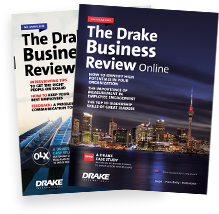Getting better results: ten leadership imperatives
Open any business publication these days, and you’ll see eye-catching headlines that reflect the growing need for rapid change, improvement, and better results: “Business as Usual a Formula for Disaster”, “Change or Die”, and “Memo to Top Manager: Improve Results or Go.”
The pressures of the global marketplace are forcing business leaders around the world to change and take action to defend their market share and protect profitability. Organizations are implementing a myriad of changes, including large-scale restructuring, process redesign, channel consolidation, and mergers and acquisitions. While all of these large-scale changes have the potential to improve performance, they will not provide a maximum return on investment without effective, hands-on, and trustworthy leadership at all levels of their enterprises.
In a series of research studies, the author of this article analyzed the behaviours of over 3,000 high performers. Time and time again, these individuals typically practise the fundamentals of leadership and management with great precision and acumen. He also observed that as the workplace becomes more complex, dynamic, and demanding, high-performance leaders tend to simplify and systematically address the critical components that stimulate individuals and teams to get better results.
These practices are called “leadership imperatives”. If an organization is truly seeking better results, then leaders at all levels must enact the following key behaviours and ask themselves the subsequent key questions.
Imperative #1: Create and maintain a clear sense of purpose. Leaders must create and maintain a clear sense of purpose for their workgroup regardless of organizational level. Each and every person must clearly understand why their workgroup exists, what goals/outcomes are most important, and how performance will be measured. In a rapidly changing environment, it is imperative that leaders constantly work to keep operations properly aligned with the mission they are pursuing.
Key Question 1: Is your team clear on its purpose and properly focused on desired outcomes?
Imperative #2: Clarify and identify your own value-added role as leader. Most business leaders these days are exceptionally busy. The real question is: “Busy doing what?” This imperative makes it clear that managers must identify the behaviours and practices that are most necessary to help their people achieve the workgroup’s mission. Leaders must then implement these practices and activities with great consistency and precision on a daily basis. High-performance leaders assess each activity to determine its contribution to delivering better performance rather than going to work and simply being “busy”.
Key Question 2: Are your daily actions supporting the goals you are attempting to accomplish?
Imperative #3: Align each person’s role to create focus and value. While managers must properly define their own roles as leaders, it is imperative that every employee do the same. As workforces are being reduced to control costs and improve productivity, each employee’s time and actions become more valuable. Successful leaders meet with their people on an ongoing basis to ensure that employees’ actions and work behaviour are properly aligned and producing desired results. In periods of change, this leadership behaviour moves from being important to critical.
Key Question 3: Are your team members engaged in behaviours that deliver desired results?
Imperative #4: Equip people to compete. It is one thing to encourage high performance; it is another to equip people to perform at the highest levels. Results-oriented leaders equip people to deliver results by ensuring they are properly trained, have the information and authority they need to get their work done, and have a requisite level of resources and the tools to perform successfully. All of these activities require planning on the part of the leader but pay great dividends in terms of better performance while reducing worker frustration and workplace chaos.
Key Question 4: Are your people equipped for success?
Imperative #5: Solve problems and remove performance barriers fast. In periods of rapid change, it is common to find a myriad of problems and barriers popping up and getting in the way of achieving results. It is imperative that leaders make problem solving and “barrier busting” a priority, and that they do so in a timely fashion. High-performance leaders typically have highly developed problem-solving and process-improvement skills; but equally important, they are also highly motivated to use those skills to solve problems and make it easier for people to get work done.
Key Question 5: Are you making it easier for people to get results?
Imperative #6: Use time with extreme care. One of the sustaining attributes of high performers is their ability to use time with extreme care and stewardship. Effective leaders identify the behaviours most important for getting results, and have the discipline to use time appropriately in supporting these activities. High performers realize that time is their most important asset and tend not to waste their own time, or that of others.This requires controlling e-mail usage and time on the phone, running effective meetings, and minimizing non-productive activity.
Key Question 6: Is your use of time really supporting the activities that get desired results?
Imperative #7: Create a climate for better results. High-performing leaders tend to monitor and measure both workgroup and individual performance on an ongoing basis. At the workgroup level, scorecards should be developed around the key metrics most critical to success. At the individual level, leaders need to motivate their staff by creating a sense of ownership of desired outcomes and accountability for getting work done. When performance is not where it needs to be, corrective action is taken. When performance meets and exceeds expectations, results-oriented leaders take great pride in celebrating success with panache.
Key Question 7: Have you created an environment where workgroup and individual performance receives a great deal of attention?
Imperative #8: Foster working relationships and teamwork. Effective leaders work hard to forge 360-degree working relationships with the people who are important to getting results, and they work even harder to keep these relationships both genuine and viable. These leaders realize their credibility is critical and is relationship based. At the same time, successful leaders realize teamwork and cooperation are vitally important at the workgroup level. They take proactive steps to conduct team-based training and problem-solving and team-building exercises to nurture this important competitive advantage.
Key Question #8: Do you invest in nurturing working relationships and teamwork with your people?
Imperative #9: Provide ongoing feedback and coaching. Getting better results requires that leaders provide their people with ongoing feedback that is balanced, accurate, and geared toward improving performance. Most employees do not receive enough feedback on their performance, and, when it does come, it is usually triggered by something negative. Successful leaders work hard to use feedback as a performance-enhancing tool to reinforce desired behaviour and to help correct and eliminate behaviour that hampers the employee’s ability to get desired results.
Key Question #9: Are you an effective and balanced coach who helps people improve their performance on an ongoing basis?
Imperative #10: Develop yourself to meet the demands of your job. Finally, and perhaps most importantly, results-oriented leaders practise continuous improvement in both their personal and professional development. It is imperative that leaders create and implement an improvement plan to help them acquire and develop the requisite skills necessary to support the specific activities and practices that lead to better results. Surprisingly, most managers do not have effective development plans, and fewer have a mentor or coach to help them improve their game.
Key Question #10: Are you developing yourself to meet the demands of your ever-changing role as a leader?
Call for actionThese ten imperatives might seem obvious to most business leaders, but the obvious is not always the modus operandi of far too many of them. Challenge yourself as a business leader. Sit down with a blank sheet of paper, without a cell phone or laptop, and answer each of these questions and see what you can learn about yourself. The research makes it clear that addressing each of these imperatives can go a long way to helping you get the results that both you and your organization need for success.
Dr. Clinton O. Longenecker is an award-winning business educator, researcher, author, speaker, business consultant, executive coach, and the Stranahan Professor of Leadership and Organizational Excellence at the University of Toledo. Specializing in rapid performance improvement in both his research and consulting, he has been engaged in applied research to identify the attributes of high-performance business leaders around the world, for the past 20 years. He has published over 140 journal articles and is the co-author of the best-selling books Getting Results: Five Absolutes for High Performance and the Two Minute Drill: Lessons on Rapid Organizational Improvement from America’s Greatest Game.
 CA-EN
CA-EN UK
UK AU
AU US
US NZ
NZ PH
PH ZA
ZA SG
SG HK
HK


